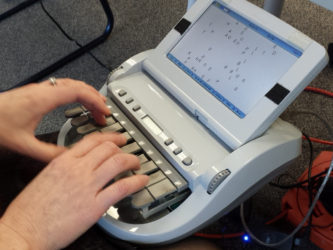 More times than not, law firms give very little thought to the court reporting firm they will use in litigation. They assume all firms have court reporters who are similarly trained and experienced. Sometimes they stick with a court reporting service they have traditionally used without assessing whether the reporters are meeting the law firm’s needs in the most effective way. These law firms may be doing themselves and their clients a disservice. This blog post will examine what to ask when hiring a court reporter.
More times than not, law firms give very little thought to the court reporting firm they will use in litigation. They assume all firms have court reporters who are similarly trained and experienced. Sometimes they stick with a court reporting service they have traditionally used without assessing whether the reporters are meeting the law firm’s needs in the most effective way. These law firms may be doing themselves and their clients a disservice. This blog post will examine what to ask when hiring a court reporter.
Choosing a highly experienced court reporter can make the deposition process easier, ensure the accuracy and integrity of the record, decrease the stress on your legal team and clients, and save time and money for all involved.
When choosing the right court reporting firm to support depositions, it will help to ask the following questions about the company’s reporters.
Is the Court Reporter Confident & Professional?
It is important that a court reporter presents themselves in a secure and professional manner throughout an entire deposition. This involves showing up on time for court and turning transcripts around in a prompt manner. While this is important, it is even more important, critical even, for the accuracy of the record that your court reporter is assertive and in control of the deposition.
For example:
- If the court reporter does not hear something clearly, they should ask for the speaker to repeat what was said.
- If the court reporter does not know how to spell a term that was said, they should ask for the proper spelling.
- Court reporters should never hesitate to ask whether something is on or off the record.
As an officer of the court, court reporters have a duty to ensure the accuracy of the record. That accuracy of the reporter’s work can have an impact on issues as important as settlement negotiations and examination and cross-examination of witnesses. It is critical that attorneys use professional, and experienced court reporters for their depositions.
Has the Reporter Deposed in Highly Technical Litigation?
Many law firms who regularly use court reporting services handle complex litigation and having the right court reporter can be invaluable. Cases involving pharmaceuticals, medical malpractice, mass torts, intellectual property, or similar issues will involve highly technical terminology. The court reporter should be familiar. This helps ensure a complete and accurate record that you can rely on in the event of a trial or an appeal.
Does the Reporter Have Access to Tech That Improves the Deposition Experience?
Court reporting firms have access to many types of technology that can increase the convenience and reliability of the deposition process. The tools a high-quality court reporting firm should provide include:
- In-house videographers who can assist in capturing non-verbal aspects of the depositions.
- Videoconferencing for long-distance depositions, which helps avoid the expense and time of travel.
- Real-time transcription technology so attorneys can see the text within seconds to help ensure accuracy and allow for clarifications during the proceeding.
If law firms want to maximize efficiency, they should make sure to choose a full-service court reporting firm. Seek a court reporting service that provides not only top-notch reporters but also the full-service assistance you need for a successful deposition.
CourtScribes.com is ready to serve you in your court reporting, videography services, interpreters, live-streaming, and video-to-text synchronization.
Although the majority of cities that offer CourtScribes’ services are in Florida, the company home base, other cities all across these United States that CourtScribes offers services in, are the following: Jacksonville, Miami, Tampa, Port St. Lucie, Fort Lauderdale, Cape Coral, Coral Springs, Clearwater, Palm Bay, Fort Myers, Weston, Sarasota, Orlando, St. Petersburg, Hialeah, Stuart, Hollywood, Naples, West Palm Beach, Boca Raton, Deerfield Beach, Jupiter, Key West, Coral Gables, Maryland, Manhattan, Buffalo, Washington DC, Baltimore, Bowie, Virginia, Frederick, Albany, New York, Brooklyn, Westchester, Gaithersberg, and Rockville.

 There are many professions that simply do not get the spotlight that they deserve. We know that we need talented doctors, dentists, and teachers. But there are other professionals who have amazing skills in essential positions. A court reporting career showcases those with those amazing skills.
There are many professions that simply do not get the spotlight that they deserve. We know that we need talented doctors, dentists, and teachers. But there are other professionals who have amazing skills in essential positions. A court reporting career showcases those with those amazing skills.
 If you have been a dedicated blog reader here at CourtScribes.com you have read about the severe shortage in the industry. Courtscribes.com is your premier court reporting and video-to-text reporting service, provider. Well, there is a Pennsylvania college that notices the shortage and wanted to help do something about it.
If you have been a dedicated blog reader here at CourtScribes.com you have read about the severe shortage in the industry. Courtscribes.com is your premier court reporting and video-to-text reporting service, provider. Well, there is a Pennsylvania college that notices the shortage and wanted to help do something about it.